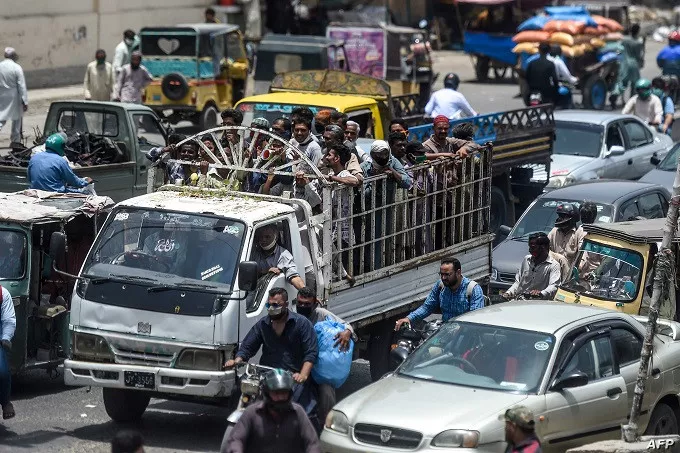Public transport: where the virus propagated
Transporters say if the administration makes a uniform policy, they are ready to implement it
ISLAMABAD:As coronavirus numbers climbed across Punjab, it seems that the twin-city district administrations and the Secretary Regional Transport Authority had chosen to stick their heads in the sand and remain willfully incognizant of the threat at large.
In such circumstances, thousands of commercial and passenger vans, metros and inter-city public transport vehicles running in the twin cities, without any heed to implementation of SOPs, have reportedly had a catalytic impact on the latest upsurge of Covid-19.
Owing to which, the capital and the garrison city had to be locked in with a new set of anti-coronavirus restrictions until September 12, one of which is a cap on inter-city transport.
The road to ruin
Per official statistics, there are a total of 14 local transport routes in Islamabad and 18 in Rawalpindi, on which operate over 161 wagons, 35 mini coasters, 2,192 pickup vans and 13 minibuses. There are over 4,641 taxis and as many as 5,592 private cabs collectively operating in the twin-city area, in addition to some 5,141 rickshaws and 50 metros operating exclusively in Rawalpindi.
Coronavirus SOPs and social distancing has been a hard-to-hammer concept in these thousands of public transport vehicles, which are often full to the brim with little breathing space; let alone a six-feet gap. While the usage of protective gear like facemasks and face-shields also virtually diminished in public spaces, following the third spell of the novel coronavirus.
“Those who do wear masks hang it around their neck like an accessory, instead of covering their airways with it,” commented one commuter, while painting a picture of the local metro. “Even the drivers, conductors and helpers of these transports do not wear masks,” he added.
Although the government had opened public transport in May, on conditions that vehicles operate with 50 per cent passenger occupancy, it appears transporters were quick to renege on their promises. Wagons, which can ideally carry 14 passengers, could be seen crammed with as many as 20 passengers during peak hours, like office and school. Coasters with seating space for 34 people would overload twice as many passengers, while metro buses with a capacity of 60 seats would be stuffed with as many as 80 passengers.
Read Antibodies from Sinovac's Covid-19 shot fade after about 6 months, booster helps
Speaking in the regard, a spokesperson of the Metro Bus Company however said that they have been actively trying to keep non-maskers out of their buses. He told that passengers without masks are denied tickets at the terminals. But even so, there is still no mechanism to enforce SOPs once the passengers have boarded the buses.
Amid lack of policing, the same conditions could also be seen spilling over to various private transport services, where cabs would frequently exceed their seating capacity; closed windows zipping through the capital’s streets like a viral hotbed on wheels.
Moreover, there appears little thought has been spared to the implementation of SOPs at public transport stops and central transport bases, where the contagion has been left at large. “Rawalpindi-Islamabad Secretary RTA teams would only for formal action. Every second or third day, 10 to 15 vehicles would be fined, but no one would bat an eyelash at the thousands of unmasked passengers,” commented a local commuter.
According to Transporters Tariq Khan and Asghar Abbasi, they would verbally ask the passengers to put on their masks, but couldn’t take them off the vehicles for non-compliance. “Initially, we would forbid passengers who did not comply with SOPs from boarding our vehicle, but a different public transport driver would agree to seat them,” told Abbasi. “Since a majority of passengers didn’t seem to comply with SOPs, we couldn’t snuff out our income by banning them, so we had no option but to let them board,” he added.
The transporters believed it was the lack of a uniform policy by the administration that made it difficult for them to regulate passengers. “If the administration makes a uniform policy, we are also ready to implement it,” urged Khan.
Secretary Regional Transport Authority Muhammad Rashid Ali, on the other hand, said that SOPs had been issued for transport bases and passengers under Covid-19. “All drivers, conductors and passengers had been given a September 12 deadline to get vaccinated. Starting from October 1, passengers, drivers and conductors who do not have a vaccination certificate are to be disallowed from entering any such vehicle. Whereas, bus station managers will be obliged to issue the driver’s vaccination certificate to the passengers and also affix it to the vehicle’s screen before the vehicle leaves,” he told.
Per Ali, vaccination centres are being set up outside each transport hub. Agreeing that the usage of masks is yet to be enforced, he said that 221 vehicles have been impounded during the last three months due to overcrowding while challans have been issued to 263 vehicles and a fine of Rs200,000 has been imposed.
Per Islamabad Inspector General Transport Authority Fayyaz Ahmed, however, strict measures have been taken to ensure that passengers wear masks in their vehicles, including snap-checking and surveillance. “The problem is that it’s hard to catch people because even those without masks quickly put one on as soon as the inspection team arrives and remove when they leave,” he told The Express Tribune.
Published in The Express Tribune, September 4th, 2021.


COMMENTS
Comments are moderated and generally will be posted if they are on-topic and not abusive.
For more information, please see our Comments FAQ